Dictation
- 格式:docx
- 大小:21.62 KB
- 文档页数:2

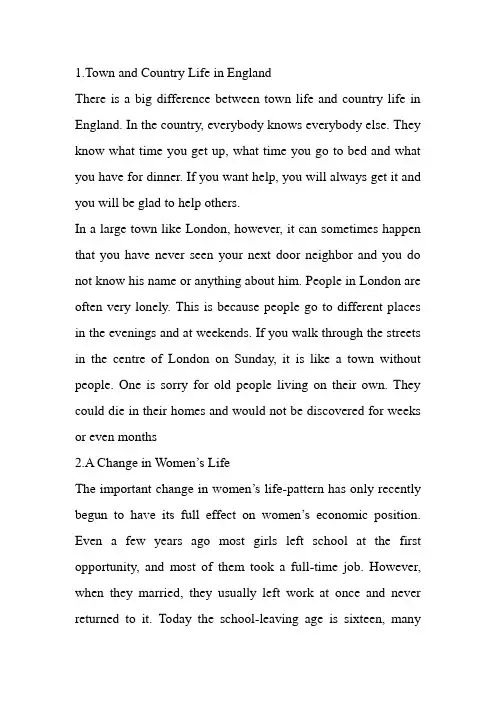
1.Town and Country Life in EnglandThere is a big difference between town life and country life in England. In the country, everybody knows everybody else. They know what time you get up, what time you go to bed and what you have for dinner. If you want help, you will always get it and you will be glad to help others.In a large town like London, however, it can sometimes happen that you have never seen your next door neighbor and you do not know his name or anything about him. People in London are often very lonely. This is because people go to different places in the evenings and at weekends. If you walk through the streets in the centre of London on Sunday, it is like a town without people. One is sorry for old people living on their own. They could die in their homes and would not be discovered for weeks or even months2.A Change in Women’s LifeThe important change in women’s life-pattern has only recently begun to have its full effect on women’s economic position. Even a few years ago most girls left school at the first opportunity, and most of them took a full-time job. However, when they married, they usually left work at once and never returned to it. Today the school-leaving age is sixteen, manygirls stay at school after that age, and though women tend to marry younger, more married women stay at work at least until shortly before their first child is born. Very many more afterwards return to full-time or part-time work. Such changes have led to a new relationship in marriage, with the husband accepting a greater share of the duties and satisfactions of family life and with both husband and wife sharing more equally in providing the money, and running the home, according to the abilities and interests of each of them.Useful Words and Expressions:1. life-pattern生活方式2. share3.A Popular Pastime of the English PeopleOne of the best means of understanding the people of any nation is watching what the do with their non-working time.Most English men, women and children love growing things, especially flowers. Visitors to England in spring, summer or autumn are likely to see gardens all they way along the railway lines. There are flowers at the airports and flowers in factory grounds, as well as in gardens along the roads. Each English town has at least one park with beautifully kept flower beds. Public buildings of every kind have brilliant window boxes andsometimes baskets of flowers are hanging on them.But what the English enjoy most is growing things themselves. If it is impossible to have a garden, then a window box or something growing in a pot will do. Looking at each other’s gardens is a popular pastime with the English.Useful Words and Expressions:1. window box:窗台上的花盆箱2.pastime 消遣,娱乐Swimming is my favorite pastime.4.British and American Police OfficersReal policemen, both in Britain and the U.S., hardly recognize any common points between their lives and what they se on TV—if they ever get home in time.Some things are almost the same, of course, but the policemen do not think much of them much of them.The first difference is that a policeman’s real life deals with the law. Most of what he learns is the law. He has to know actually what actions are against the law and what facts can be used to prove them in court. He has to know nearly as much law as a lawyer, and what’s more, he has to put it into practice on his feet, in the dark and, running down a narrow street after someone hewants to talk to.Little of his time is spent in talking with beautiful girls or in bravely facing cruel criminals. He will spend most of his working life arranging millions of words on thousands of forms about hundreds of sad, ordinary people who are guilty--- or not of stupid, unimportant crimes.Useful Words and Expressions:1. think much of 重视,尊重2. in court 在法庭上3. criminal 罪犯,犯罪者4. guilty 犯罪的,有罪的5.Living SpaceHow much living space does a person need? What happens when his space needs are not met? Scientists are doing experiments on rats to try to determine the effects of overcrowded conditions on man. Recent studies have shown that the behavior of rats is greatly affected by space. If rats have enough living space, they eat well, sleep well and produce their young well. But if their living conditions become too crowded, their behavior and even their health change obviously. They can not sleep and eat well, and signs of fear and worry become clear. The more crowded they are, and more they tend to bite eachother and even kill each other. Thus, for rats, populations and violence are directly related. Is this a natural law for human society as well? Is enough space not only satisfactory, but necessary for human survival? These are interesting questions.6.The United NationsIn 1945, representatives of 50 nations met to plan this organization. It was called the United Nations. After the war, many more nations joined.There are two major parts of the United Nations. One is called the General Assembly. In the General Assembly, every member nation is represented and has an equal vote.The second part is called the Security Council. It has representatives of just 15 nations. Five nations are permanent members: the United States, Russia, France, Britain, and China. The 10 other members are elected every two years by the General Assembly.The major job of the Security Council is to keep peace in the world. If necessary, it can send troops from member nations to try to stop little wars before they turn into big ones.It is hard to get the nations of the Security Council to agree on when this is necessary. But they did vote to try to stop wars.Useful Words and Expressions:1. representative 代表2. General Assembly 联合国大会3. permanent 永久的,持久的4. Security Council 联合国安全理事会7.PlasticWe use plastic wrap to protect our foods. We put our garbage in plastic bags or plastic cans. We sit on plastic chairs, play with plastic toys, drink from plastic cups, and wash our hair with shampoo from plastic bottles!Plastic does not grow in nature. It is made by mixing certain things together. We call it a produced or manufactured material. Plastic was first made in the 1860s from plants, such as wood and cotton. That plastic was soft and burned easily.The first modern plastics were made in the 1930s. Most clear plastic starts out as thick, black oil. That plastic coating inside a pan begins as natural gas.Over the years, hundreds of different plastics have been developed. Some are hard and strong. Some are soft and bendable. Some are clear. Some are many-colored. There is a plastic for almost every need. Scientists continue to experiment with plastics. They hope to find even ways to use them!8. Display of GoodsAre supermarkets designed to persuade us to buy more?Fresh fruit and vegetables are displayed near supermarket entrances. This gives the impression that only healthy food is sold in the shop. Basic foods that everyone buys, like sugar and tea, are not put near each other. They are kept in different aisles so customers are taken past other attractive foods before they find what they want. In this way, shoppers are encouraged to buy products that they do not really need.Sweets are often placed at children’s eye level at the checkout. While parents are waiting to pay, children reach for the sweets and put them in the trolley.More is bought from a fifteen-foot display of one type of product than from a ten-foot one. Customers also buy more when shelves are full than when they are half empty. They do not like to buy from shelves with few products on them because they feel there is something wrong with those products that are there.Useful Words and Expressions:1. aisle 走廊,过道2. trolley 手推车3. checkout 收款台9.Albert EinsteinAlbert Einstein was born in Germany in 1879, His father owned a factory that made electrical devices. His mother enjoyed music and books. His parents were Jewish but they did not observe many of the re ligion’s rules. Albert was a quite child who spent much of his time alone. He was slow to talk and had difficulty learning to read. When Albert was five years old, his father gave him a compass. The child was filled with wonder when he discovered that the compass needle always pointed in the same direction—to be north. He asked his father and his uncle what caused the needle to move. Their answers about magnetism and gravity were difficult for the boy to understand. Yet he spent a lot of time thinking about them. He said later that he felt something hidden had to be behind things.Useful expressions and words:1. device 装置,设备leave to one’s own devices 听任某人自行其是,允许某人按自己的意愿做事She left the child to her own devices for an hour in the afternoon.她允许孩子在下午有一个小时的自由支配时间。
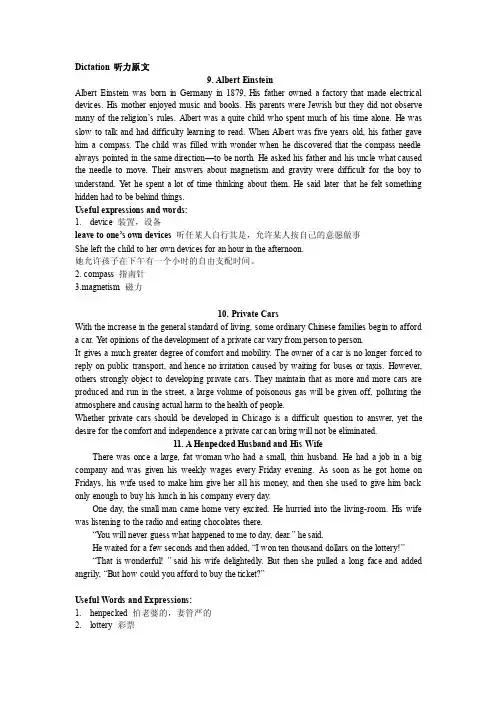
Dictation 听力原文9. Albert EinsteinAlbert Einstein was born in Germany in 1879, His father owned a factory that made electrical devices. His mother enjoyed music and books. His parents were Jewish but they did not observe many of the religion’s rules. Albert was a quite child who spent much of his time alone. He was slow to talk and had difficulty learning to read. When Albert was five years old, his father gave him a compass. The child was filled with wonder when he discovered that the compass needle always pointed in the same direction—to be north. He asked his father and his uncle what caused the needle to move. Their answers about magnetism and gravity were difficult for the boy to understand. Y et he spent a lot of time thinking about them. He said later that he felt something hidden had to be behind things.Useful expressions and words:1.device 装置,设备leave to one’s own devices 听任某人自行其是,允许某人按自己的意愿做事She left the child to her own devices for an hour in the afternoon.她允许孩子在下午有一个小时的自由支配时间。
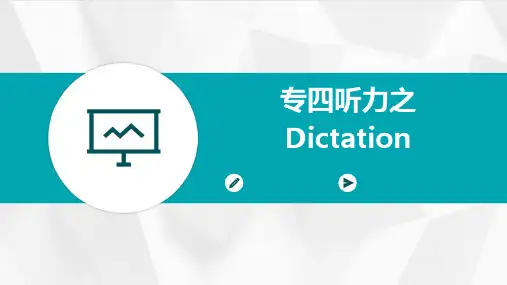
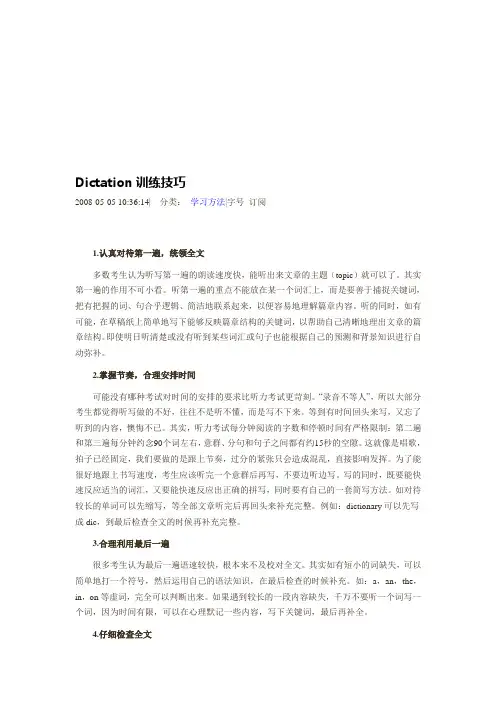
Dictation训练技巧2008-05-05 10:36:14| 分类:学习方法|字号订阅1.认真对待第一遍,统领全文多数考生认为听写第一遍的朗读速度快,能听出来文章的主题(topic)就可以了。
其实第一遍的作用不可小看。
听第一遍的重点不能放在某一个词汇上,而是要善于捕捉关键词,把有把握的词、句合乎逻辑、简洁地联系起来,以便容易地理解篇章内容。
听的同时,如有可能,在草稿纸上简单地写下能够反映篇章结构的关键词,以帮助自己清晰地理出文章的篇章结构。
即使明日听清楚或没有听到某些词汇或句子也能根据自己的预测和背景知识进行自动弥补。
2.掌握节奏,合理安排时间可能没有哪种考试对时间的安排的要求比听力考试更苛刻。
“录音不等人”,所以大部分考生都觉得听写做的不好,往往不是听不懂,而是写不下来。
等到有时间回头来写,又忘了听到的内容,懊悔不已。
其实,听力考试每分钟阅读的字数和停顿时间有严格限制:第二遍和第三遍每分钟约念90个词左右,意群、分句和句子之间都有约15秒的空隙。
这就像是唱歌,拍子已经固定,我们要做的是跟上节奏,过分的紧张只会造成混乱,直接影响发挥。
为了能很好地跟上书写速度,考生应该听完一个意群后再写,不要边听边写。
写的同时,既要能快速反应适当的词汇,又要能快速反应出正确的拼写,同时要有自己的一套简写方法。
如对待较长的单词可以先缩写,等全部文章听完后再回头来补充完整。
例如:dictionary可以先写成dic,到最后检查全文的时候再补充完整。
3.合理利用最后一遍很多考生认为最后一遍语速较快,根本来不及校对全文。
其实如有短小的词缺失,可以简单地打一个符号,然后运用自己的语法知识,在最后检查的时候补充。
如:a,an,the,in,on等虚词,完全可以判断出来。
如果遇到较长的一段内容缺失,千万不要听一个词写一个词,因为时间有限,可以在心理默记一些内容,写下关键词,最后再补全。
4.仔细检查全文通过平时训练,发现许多同学不仔细检查所听写内容,认为录音已经放完,听不出来的内容已经没有办法补救了。
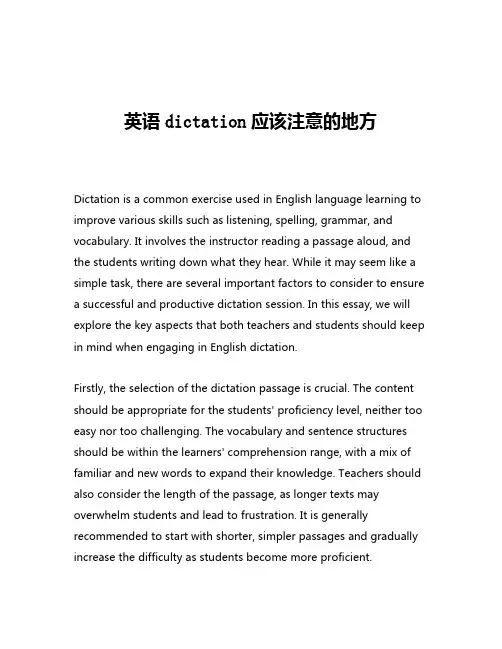
英语dictation应该注意的地方Dictation is a common exercise used in English language learning to improve various skills such as listening, spelling, grammar, and vocabulary. It involves the instructor reading a passage aloud, and the students writing down what they hear. While it may seem like a simple task, there are several important factors to consider to ensure a successful and productive dictation session. In this essay, we will explore the key aspects that both teachers and students should keep in mind when engaging in English dictation.Firstly, the selection of the dictation passage is crucial. The content should be appropriate for the students' proficiency level, neither too easy nor too challenging. The vocabulary and sentence structures should be within the learners' comprehension range, with a mix of familiar and new words to expand their knowledge. Teachers should also consider the length of the passage, as longer texts may overwhelm students and lead to frustration. It is generally recommended to start with shorter, simpler passages and gradually increase the difficulty as students become more proficient.Secondly, the delivery of the dictation is of utmost importance. The instructor's pace should be clear, consistent, and not too rapid, allowing students to process the information and write it down accurately. Pauses between sentences or phrases can help students organize their thoughts and ensure they capture the complete meaning. Additionally, the instructor should avoid excessive repetition, as it may distract students and interfere with their focus. Instead, they should read the passage through once, and then repeat it at a slightly slower pace, if necessary.Another crucial factor is the environment in which the dictation takes place. The classroom should be free from distractions and noise, providing a quiet and conducive setting for students to concentrate. Seating arrangements should be organized in a way that minimizes the potential for cheating or copying, such as ensuring adequate spacing between desks. The lighting and temperature should also be comfortable, as these factors can impact the students' ability to focus and write effectively.Furthermore, the assessment and feedback process in dictation exercises is crucial. Teachers should carefully review the students' work, providing constructive feedback on their spelling, grammar, and overall comprehension of the passage. This feedback should be specific and actionable, highlighting areas for improvement and offering guidance on how to address them. Depending on thestudents' level, teachers may also consider allowing them to self-correct or peer-review their work, fostering a sense of ownership and responsibility for their learning.It is also important to recognize the diverse learning styles and needs of students. Some may excel in auditory learning, while others may benefit more from visual or kinesthetic approaches. Teachers should be prepared to accommodate these differences by incorporating various techniques, such as providing visual aids, allowing students to record the dictation, or incorporating movement-based activities. By catering to the individual needs of students, teachers can enhance the effectiveness of the dictation exercise and ensure that all learners can actively participate and succeed.Additionally, the frequency and integration of dictation within the overall language curriculum should be considered. While regular practice is essential for improving skills, it is important to strike a balance and not overload students with too many dictation exercises. Teachers should also explore ways to integrate dictation into other language learning activities, such as reading comprehension, writing exercises, or vocabulary development. This holistic approach can help students see the relevance of dictation and apply the skillsthey've learned in more meaningful and practical contexts.Finally, it is crucial for both teachers and students to approachdictation with a positive and growth-oriented mindset. Mistakes should be viewed as opportunities for learning, and students should be encouraged to take risks and learn from their errors. Teachers can foster this mindset by creating a supportive and non-judgmental classroom environment, where students feel comfortable making mistakes and seeking help when needed. By cultivating a positive and collaborative learning atmosphere, students are more likely to engage actively in the dictation process and make meaningful progress in their English language development.In conclusion, effective English dictation requires a multifaceted approach that considers various factors, from the selection of the passage to the assessment and feedback process. By paying attention to these key aspects, both teachers and students can maximize the benefits of dictation exercises and enhance the overall language learning experience. Ultimately, the goal of English dictation should be to develop well-rounded language skills, foster a love for learning, and empower students to communicate effectively in a global, English-speaking world.。

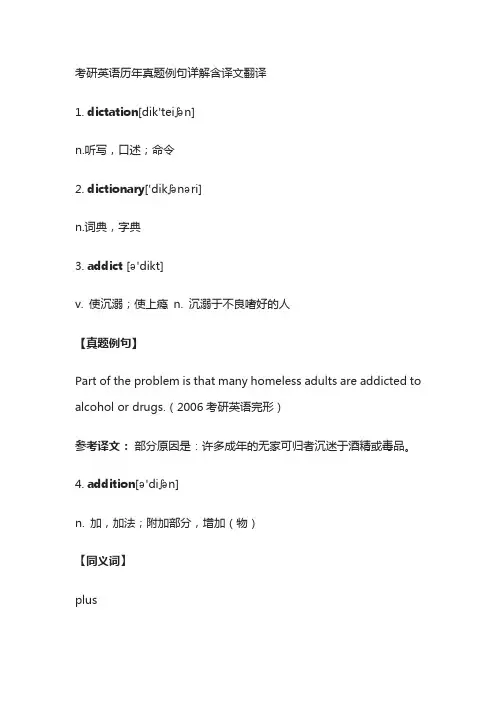
考研英语历年真题例句详解含译文翻译1. dictation[dik'teiʃən]n.听写,口述;命令2. dictionary['dikʃənəri]n.词典,字典3. addict [ə'dikt]v. 使沉溺;使上瘾n. 沉溺于不良嗜好的人【真题例句】Part of the problem is that many homeless adults are addicted to alcohol or drugs.(2006考研英语完形)参考译文:部分原因是:许多成年的无家可归者沉迷于酒精或毒品。
4. addition[ə'diʃən]n. 加,加法;附加部分,增加(物)【同义词】plus【真题例句】Children need to learn addition and subtraction.(201考研英语阅读Text 3)参考译文:小孩需要去学习加法和减法。
5. contradict[,kɔntrə'dikt]v.反驳;同…矛盾,同…抵触[同义词]Deny[真题例句]Three provisions of Arizona's plan were overturned because they contradicted both the federal and state policies.(2013考研英语阅读Text4)参考译文:亚利桑那州计划的三项规定与联邦和州政策相矛盾,因而被否决。
6. contradiction[,kɔntrə'dikʃən]n.反驳,否认;矛盾,不一致[同义词]Discrepancy7. dedicate['dedikeit]vt.奉献;献身于[同义词]devote[真题例句]After all, what is the one modern form of expression almost completely dedicated to depicting happiness?(2006考研英语阅读Test4)参考译文:现代社会最热衷于表达快乐的一种时髦形式到底是什么呢?8. dedication9. indicate ['indikeit]v. 指出,指示;表明,暗示【同义词】manifest【真题例句】The ways of reading indicated here are without doubt kinds of comprehension.(2015新题型)参考译文:这里暗示的阅读方式毫无疑问是理解方式。
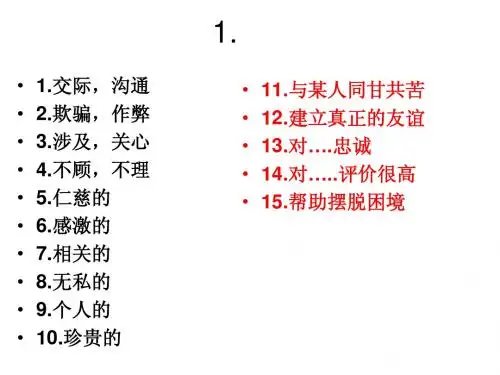
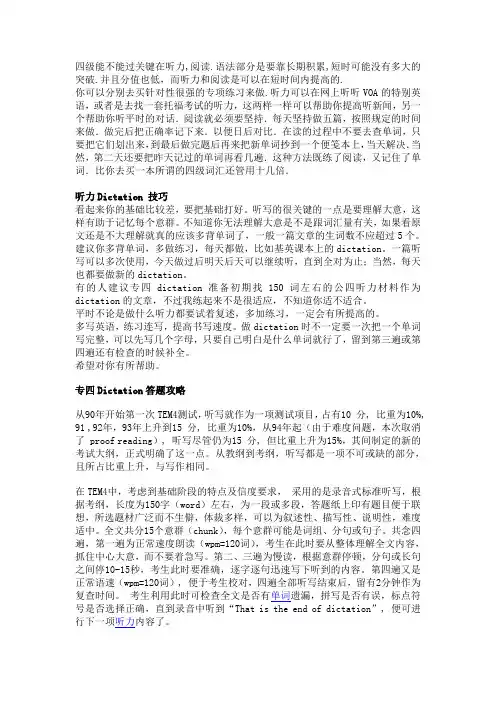
四级能不能过关键在听力,阅读.语法部分是要靠长期积累,短时可能没有多大的突破.并且分值也低,而听力和阅读是可以在短时间内提高的.你可以分别去买针对性很强的专项练习来做.听力可以在网上听听VOA的特别英语,或者是去找一套托福考试的听力,这两样一样可以帮助你提高听新闻,另一个帮助你听平时的对话.阅读就必须要坚持.每天坚持做五篇,按照规定的时间来做.做完后把正确率记下来.以便日后对比.在读的过程中不要去查单词,只要把它们划出来,到最后做完题后再来把新单词抄到一个便笺本上,当天解决.当然,第二天还要把昨天记过的单词再看几遍.这种方法既练了阅读,又记住了单词.比你去买一本所谓的四级词汇还管用十几倍.听力Dictation 技巧看起来你的基础比较差,要把基础打好。
听写的很关键的一点是要理解大意,这样有助于记忆每个意群。
不知道你无法理解大意是不是跟词汇量有关,如果看原文还是不大理解就真的应该多背单词了,一般一篇文章的生词数不应超过5个。
建议你多背单词,多做练习,每天都做,比如基英课本上的dictation。
一篇听写可以多次使用,今天做过后明天后天可以继续听,直到全对为止;当然,每天也都要做新的dictation。
有的人建议专四dictation准备初期找150词左右的公四听力材料作为dictation的文章,不过我练起来不是很适应,不知道你适不适合。
平时不论是做什么听力都要试着复述,多加练习,一定会有所提高的。
多写英语,练习连写,提高书写速度。
做dictation时不一定要一次把一个单词写完整,可以先写几个字母,只要自己明白是什么单词就行了,留到第三遍或第四遍还有检查的时候补全。
希望对你有所帮助。
专四Dictation答题攻略从90年开始第一次TEM4测试,听写就作为一项测试项目,占有10 分, 比重为10%, 91 ,92年,93年上升到15 分, 比重为10%,从94年起(由于难度问题,本次取消了 proof reading), 听写尽管仍为15 分, 但比重上升为15%,其间制定的新的考试大纲,正式明确了这一点。
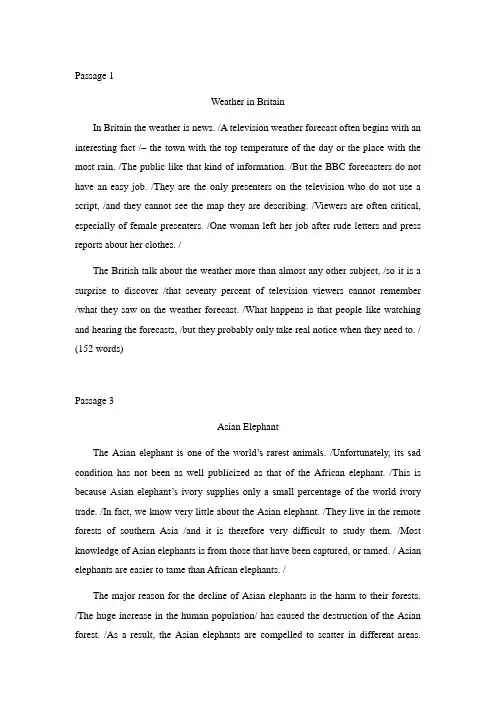
Passage 1Weather in BritainIn Britain the weather is news. /A television weather forecast often begins with an interesting fact /– the town with the top temperature of the day or the place with the most rain. /The public like that kind of information. /But the BBC forecasters do not have an easy job. /They are the only presenters on the television who do not use a script, /and they cannot see the map they are describing. /Viewers are often critical, especially of female presenters. /One woman left her job after rude letters and press reports about her clothes. /The British talk about the weather more than almost any other subject, /so it is a surprise to discover /that seventy percent of television viewers cannot remember /what they saw on the weather forecast. /What happens is that people like watching and hearing the forecasts, /but they probably only take real notice when they need to. / (152 words)____________________________________________________________________ Passage 3Asian ElephantThe Asian elephant is one of the world’s rarest animals. /Unfortunately, its sad condition has not been as well publicized as that of the African elephant. /This is because Asian elephant’s ivory supplies only a small percentage of the world ivory trade. /In fact, we know very little about the Asian elephant. /They live in the remote forests of southern Asia /and it is therefore very difficult to study them. /Most knowledge of Asian elephants is from those that have been captured, or tamed. / Asian elephants are easier to tame than African elephants. /The major reason for the decline of Asian elephants is the harm to their forests. /The huge increase in the human population/ has caused the destruction of the Asian forest. /As a result, the Asian elephants are compelled to scatter in different areas./Originally they lived all over the continent, /but now there are only small isolated populations left. /They are vulnerable to extinction. / (159 words)___________________________________________________________________ Passage 4Happy CommutersThe Golden Gate Bridge joins the beautiful city of San Francisco /with the suburbs to the north. /Each day about one hundred thousand automobiles cross the bridge /taking people to and from the city. /More than half of them cross the bridge during the morning and evening rush hours. /When traffic is so heavy, the trip is not pleasant. /Now, however, there is at least one group of happy commuters. /These are people who travel under the bridge instead of on it. /They go to work by boat /and enjoy it so much that most of them say they will never go by car again. /The ferry they take is spacious, quiet and comfortable. /Commuters can enjoy the sun on deck. /The trip takes only 30 minutes and is not very costly. /Best of all, being on boat seems to make people more friendly toward each other. /There has always been a marriage of two commuters who met on the ferry. / (162 words)____________________________________________________________________ Passage 5The Red CrossThe worldwide Organization of the Red cross stems from the ideal of Henri Dunant, a Swiss Banker. /On 24th, June 1859, on his way from Geneva to France, /Dunant witnessed a battle. /It was one of the fiercest battles of the 19th century. /Shocked by the lack of medical supplies and attention given to the wounded, /Dunant decided that volunteer service had to be organized. /He gathered together a number of women /who attended the hundreds of wounded soldiers of all nationalities /and helped the surgeons as best they could. /He determined to form a body of people /who would rally together in times of war and attend to the needs of the wounded and thedying. /Many Europeans states supported him /and on 22nd, August 1864 the first Geneva Convention was signed. /This lays down that once a soldier is wounded /everyone else who comes to his help ceases to be an enemy. / (154 words)____________________________________________________________________ Passage 6Cars in the FutureWhat kind of care will we be driving by the year 2030? /Rather different from the type we know today. /With the next decade bringing greater change than the past 50 years, /the people who will be designing the models of tomorrow believe that /environmental problems may well accelerate the pace of the car’s deve lopment. /The vision is that of a machine with 3 wheels instead of 4, /electrically-powered, environmentally clean and able to drive itself along intelligent roads, /equipped with built-in power supplies. /Future cars will pick up the fuel during long journeys /from a power source built into the road. /This view of future cars is based on a much more sophisticated road system. /Cars will be automatically controlled by a computer. /All the driver will have to do is to say where to go /and the computer will do the rest. /It will be impossible for cars to crash into one another. / (155 words)____________________________________________________________________ Passage 7Dogs as PetsMost people have had a dog or wanted one as their companion at some time in their life. /If you are thinking of buying a dog, /you should first decide what sort of companion you need. /You must also be ready to devote a good deal of time to train the dog when it is young /and give it the exercise it needs throughout its life. / Dogs are demanding pets. /Whereas cats identify with the house /and so are content if their place is secure, /a dog identifies with its master /and consequently wants him to show proof of his affection. /The best time to buy a baby-dog is when itis between 6-8 weeks old /so that it can transfer its affection from its mother to its master. /If baby-dogs have not established a relationship with the human being /until they are over 3 months old, /their strong relationship will always be with dogs. / (156 words)_____________________________________________________________________ Passage 8Why Do We Cry?Why do we cry? /Can you imagine life without tears? /Not only do tears keep your eyes lubricated, /they also contain a substance that kills certain bacteria so they cannot infect your eyes. /Give up tears, and you will lose this on-the-spot defense. /Nobody wants to give up the flood of extra tears you produce /when you get something physical or chemical in your eyes. /Tears are very good at washing this irrit ating stuff out. /Another thing you couldn’t do without your tears is cry from joy, anger or sadness. /Humans are the only animals that produce tears in response to emotions, /and most people say a good cry makes them feel better. /Many scientists, therefore, believe that crying somehow helps us cope with emotional situations. /It may be that tears discharge certain chemicals from your body, /chemicals that build up during stress. /What do you think will happen to people who restrain their tears? / (155 words)_____________________________________________________________________ Passage 10The MarsScience fiction writers have often imagined humans going to live on the Mars. /But these days, scientists are taking the idea seriously. /It has a great deal to recommend it, /since it might solve the problem of overcrowding on the earth. /But obviously, it would not be worth making the effort /unless people could live there naturally. /If the atmosphere were like that of the earth, /this might be possible. /Apartfrom that, there are other problems to overcome. /For example, the temperature would have to be raised from 6 degrees below zero to 15 degrees above it. /Scientists who study Mars have laid down the program that they can follow. /To begin with, they will have to find out /whether life has ever existed on the planet of Mars in the past. /Secondly, they will have to make a reliable map of its surface. /And finally, they will have to make a list of the gases on Mars. / (159 words)____________________________________________________________________ Passage 11SharksTo most of us sharks are the most dangerous fish in the sea and they attack humans. /However, according to Doctor Clark, who has studied the behavior of sharks for 12 years, /humans are not normally on the shark’s menu. /She also found that sharks don’t eat as much as people think. /For instance, a 9-year-old shark only needs two pounds of food a day to keep healthy. /But she says, sharks sometimes starve /and at other times they fill themselves with what they have killed. /Around the world, there are only about one hundred shark attacks on humans each year, /ten of which proved fatal. /If you went underwater-fishing and saw a shark, /you could be in trouble. /The shark might go for the injured fish you have attacked /and take a bite of you at the same time. /If you go into a shark’s territory and threaten it, /it might try to bite you because sharks are territorial. / (160 words)_____________________________________________________________________Passage 12Waterways in the USIn the early 19th century, waterways in the middle of the United States /providedNorth America the most popular form of long distance transport. /Travel by river was often more convenient than taking a wagon over country roads, /especially when shipping heavy loads of farm products or household goods. /When the natural waterways were not adequate, /shallow canals were built. /The Erie Canal, opened in 1825, /connected the Great Lakes with the upper Hudson River. /It allowed residents in the Great Lakes region /to send their crops eastward to New York City at a much lower cost. /The construction of the Erie Canal also encouraged people to move westward. /The city of Detroit and Chicago became flourishing cities. /By the mid 1800, faster and cheaper railroads became more popular /and the canal system declined. /During the first third of the century, however, /transport on the rivers, lakes and canals aided greatly in the growth of the United States. /(158 words)____________________________________________________________________ Passage 13The English LanguageEnglish is increasingly significant in the globalization of the world. /Generally, English is the most important linguistic vehicle in all the human activities carried out worldwide. /These activities include application of science and technology /in medicine, transport, entertainment and information technology /and all the other fields related to human life. /Science and technology cannot do without languages, /which are symbolic systems though not the only ones. /In a world where there are global human enterprises, /a language that is widely understood, /and that can be used across the boundaries of different countries, is a necessity. /English has been extensively used for the purposes of exchanging information. /No matter whether English is more suited to be used as an international language or not, /it is really suited to a great variety of scientific and technological purposes. /It has a very large vocabulary /and all sorts of ways of extending its vocabulary that is already much ample to meet changing needs. /(159 words)____________________________________________________________________ Passage 14GlobalizationPeople around the globe are more connected to each other than ever before. /“The Era of Globalization” is fast becoming the preferred term for describing the current times. /Globalization is a process of interaction and integration /among the people, companies, and governments of different nations, /a process driven by international trade and investment and aided by information technology. /This process has effects on the environment, on culture, on political systems, /on economic development and prosperity, /and on human physical well-being in societies around the world.Policy and technological developments of the past few decades /have spurred increases in cross-border trade, investment, and migration so large that / many observers believe the world has entered a qualitatively new phase in its economic development.Technology has been the other principal driver of globalization. /Advances in information technology, in particular, have dramatically transformed economic life. /Information technologies have given consumers, investors and businesses /valuable new tools for identifying and pursuing economic opportunities. /(158 words)____________________________________________________________________ Passage 17British Pub CultureVisitors to Britain may find the best place to sample local culture is in a traditional pub. / Most pubs have no waiters / --you have to go to the bar to buy drinks. / This may sound inconvenient, / but there is a hidden purpose. / Pub culture is designed to promote sociability in a society known for its reserve. / Standing at the bar for service / allows you to chat with others waiting to be served. / The bar counteris possibly the only site in the British Isles / in which friendly conversation with strangers is considered really quite normal behavior. / The trouble is that if you do not follow the local rules, / the experience may fall flat. / For example, if you are in a big group, / it is best if only one or two people go to buy the drinks. / Nothing irritates the regular customers while they chat about what to order.(163 words)_____________________________________________________________________ Passage 18 CoffeeCoffee is a brewed beverage prepared from roasted seeds, / commonly called coffee beans. / Due to its caffeine content, / coffee has a stimulating effect in humans. / Today, coffee is one of the most popular beverages worldwide. /Coffee was first consumed in the ninth century, / when it was discovered in the highlands of Ethiopia. / Coffee has played an important role in many societies throughout history. / In Africa, it was used in religious ceremonies. /Coffee is an important export commodity. / In 2004, coffee was the top agricultural export for 12 countries, / and in 2005, it was the world's seventh largest legal agricultural export by value. /Some controversy is associated with coffee cultivation and its impact on the environment. / Many studies have examined the relationship between coffee consumption and certain medical conditions. / Whether the overall effects of coffee are positive or negative is still disputed. (159 words)_____________________________________________________________________ Passage 19Buses in LondonThe London Bus is one of London's principal icons. / Although the Routemaster has now been largely phased out of service, / with only two heritage routes still using the vehicles,/ the majority of buses in London are still red / and therefore the red bus remains an iconic symbol of the city./In Britain bus-type vehicles used for long distances / or where it is not possible to get on at any stop / and buy a ticket are always called coaches rather than buses. / Buses have been used on the streets of London since 1829, / and in 1855 the London General Omnibus Company or LGOC was founded / to regulate the horse-drawn omnibus services then operating in London. / LGOC began using motor omnibuses in 1902, / and manufactured them itself from 1909./ The last LGOC horse-drawn bus ran on 25 October 1911, / although independent operators used them until 1914. (155 words)____________________________________________________________________ Passage 20American FoodMany meals in America are arranged around popular television shows. / People like to eat in front of the TV, / and they sit in a chair or on a sofa. / Cooking in the USA is not just hamburgers, pizza and fast food. / However, the American fast food restaurant chains / have been very successful at introducing American-style fast food around the world. / Now people from many lands believe / it is what everyone eats all the time in the USA. /Most traditional American foods were introduced by the early European immigrants / but modified to take advantage of the locally available ingredients. / Fried chicken, meatloaf, baked potato, corn, baked beans and apple pie / would be considered traditional American dishes. /Regional cooking varies from state to state / and is highly influenced by the types of ingredients locally available, / as well as the cultural background of the people that settled in the area. / (165 words)____________________________________________________________________ Passage 21New YorkThe City of New York has been the most populous city in the United States since 1790, / while the New York metropolitan area / ranks among the most populous urban areas in the world. / A leading global city, / it exerts a powerful influence over worldwide finance, culture, fashion and entertainment. / As host of United Nations headquarters, / New York is also an important center for international affairs./ The city's estimated population exceeds 8.2 million people / living in just under 305 square miles,/ making New York City the most densely populated major city. / New York is notable among American cities for its high use of mass transit, / much of which runs 24 hours, / and for the overall density and diversity of its population. / The city is sometimes referred to as "The City that Never Sleeps", / while other nicknames include Gotham and the Big Apple. /(153 words)_____________________________________________________________________Passage 22Public SchoolPublic-school education is the most common form of education in the United States / and is provided mainly by local governments, / with control and funding coming from three levels: / federal, state, and local./ Curricula, funding, teaching, and other policies are set / through locally elected school boards by jurisdiction over school districts. / The school districts are special-purpose districts / authorized by provisions of state law. / Generally, state governments can and do set minimum standards / relating to almost all activities of primary and secondary schools, / as well as funding and authorization to enact local school taxes to support the schools. / The federal government funds aid to states and school districts / that meet minimum federal standards. / The first tax-supported public school in America was inMassachusetts. / The vast majority of adults born in the U.S. have attended a U.S. public school. / (149 words)_____________________________________________________________________ Passage 24French FriesFrench fries, or french-fried potatoes are thin strips of potato / that have been deep-fried. / They are popular in many countries / and go by many names in various languages. / A distinction is sometimes made between fries and chips. / North Americans often refer to any elongated pieces of fried potatoes as fries, / while in other parts of the world, / long slices of potatoes are sometimes called fries to contrast them with the thickly cut strips, / which are often referred to as chips. / French fries can contain a large amount of fat or oils from frying. / Some researchers have suggested / that the high temperatures used for frying such dishes may have results harmful to health. / In the United States about ¼ of vegetables consumed are prepared as French fries / and are proposed to contribute to widespread obesity. / Many restaurants now advertise their use of unsaturated oils. / (158 words) Passage 25MoneyMoney is anything that is generally accepted as payment / for goods and services and repayment of debts./ The main uses of money are as a medium of exchange, / a unit of account, and a store of value. / Some authors explicitly require money to be a standard of deferred payment. / The dominant form of money is currency. / The term "price system" is sometimes used / to refer to methods using commodity valuation or money accounting systems. /Money is used as an intermediary for trade, / in order to avoid the inefficiencies of a barter system, / which are sometimes referred to as the 'double coincidence ofwants problem'. / Such usage is termed a medium of exchange. / In economics, money is a broad term that refers to any financial instrument / that can fulfill the functions of money. / Modern monetary focuses on the liquidity of the financial instrument used as money. / (158 words)_____________________________________________________________________ Passage 26NewspapersA newspaper is a publication containing news, information, and advertising. / General-interest newspapers often feature articles / on political events, crime, business, entertainment, society and sports. / Most traditional papers also feature an editorial page / containing columns that express the personal opinions of writers./ Supplementary sections may contain advertising, comics, and coupons./ Newspapers are most often published on a daily or weekly basis, / and they usually focus on one particular geographic area where most of their readers live. / Despite recent setbacks in circulation and profits, / newspapers are still the most iconic outlet for news and other types of written journalism. /By the late 1990s,the Internet posed an ongoing challenge / to the business model of most newspapers in developed countries. / Many newspapers around the world launched online editions / in an attempt to follow or stay ahead of their audience. / However, in the rest of the world, newspapers continue to grow. / (160 words)_____________________________________________________________________Passage 27The History of TeaAfter water, tea is the most widely-consumed beverage in the world. / The Chinese have consumed tea for thousands of years. / People of the Han Dynasty used tea as medicine. / China is considered to have the earliest records of tea consumption, / with records dating back to the 10th century BC. / Legend has it that master Lao Zi was saddened by society's moral decay and, / sensing that the end of the dynasty was near, / he journeyed westward to the unsettled territories, / never to be seen again./ While passing along the nation's border, / he encountered and was offered tea by a customs inspector, / who encouraged him to compile his teachings into a single book / so that future generations might benefit from his wisdom. / This then became known as the Dao De Jing, a collection of Laozi's sayings. / A national custom of offering tea to guests began in China. / (158 words)____________________________________________________________________ Passage 28ChristmasEvery year after Thanksgiving, / most people’s thoughts turn to Christmas. / It is the time when professing Christians are supposed to focus on Jesus Christ. / It is the day we celebrate as the birthday of Jesus. / There are special Christmas services in Christian churches all over the world. / But many of the festivities of Christmas do not have anything to do with religion. / Exchanging gifts and sending Christmas cards / are the modern ways of celebrating the Christmas in the world. / And the Christmas has become popular /when Christmas cards appeared in 1846 / and the concept of a jolly Santa Claus was first made popular in nineteenth Century. / Christmas is thought by most to be a wonderful time, / focusing the participants on /giving, family togetherness, beautiful music and decorations, / feasting on special foods and singing Christmas carols throughout the neighborhood. / (150 words)Passage 29For years, students were assured that with a college degree in hand / they could acquire an excellent job. / In recent years, however, several developments / havesignaled the onset of a change / in the supply-demand relationship in the services of higher education. / Teachers with terminal degrees far outnumber / the available teaching positions in many disciplines. / The chairman of a science department today / may receive three to four hundred applications / for a position that once attracted only half a dozen. / Administrations of colleges and universities must be prepared / to enter into competition with all other suppliers of products and services. / Today’s students are in touch with the reality of the world, / and they realize that while a degree may obtain the first job for them, / keeping the job and advancing depend upon the education behind the degree. (148 words)_____________________________________________________________________ Passage 33Credit Card SecurityCredit card security relies on the physical security of the plastic card / as well as the privacy of the credit card number. / Therefore, whenever a person other than the card owner / has access to the card or its number, / security is potentially compromised. / Once, merchants would often accept credit card numbers / without additional verification for mail order purchases. / It's now common practice to only ship to confirmed addresses / as a security measure to minimize fraudulent purchases. / Some merchants will accept a credit card number for in-store purchases, / but many require the card itself to be present, / and require a signature. / A lost or stolen card can be cancelled, / and if this is done quickly, / will greatly limit the fraud that can take place in this way. / (141 words)____________________________________________________________________ Passage 34Independent FilmmakingFilmmaking also takes place outside of the mainstream / and is commonly called independent filmmaking. / Since the introduction of DV technology, / the means ofproduction have become more democratized./ Filmmakers can conceivably shoot and edit a film, / create and edit the sound and music, / and mix the final cut on a home computer. / However, while the means of production may be democratized, / financing, distribution, and marketing remain difficult to accomplish outside the traditional system. / Most independent filmmakers rely on film festivals / to get their films noticed and sold for distribution. / However, the Internet has allowed for relatively inexpensive distribution of independent films; / many filmmakers post their films online for critique and recognition./ Although there is little profitability in this, / a filmmaker can still gain exposure via the web. (139 words)____________________________________________________________________。
1. SaltWe do not know when men fisrt began to use salt. But we do know that it has been used in many different ways through old history. Historical evident shows, for example, that people who lived over 3000 years ago ate salted fish. Thousands of years ago in Egypt, salt was used to preserve the dead. Stealing salt was considered a major crime during some periods of history. In 18th century for instance, if a person was account stealing salt, he can be put in jail. History records that about 10,000 people were put in jail during that century for stealing salt. About 150 years before, in the year 1553, taking more salt than one was allowed to was punishable as a crime, the offender's ear was cut off. Salt was an important item on the table of royalty. It was traditionaly placed in front of the king when he sat down to eat. Important guests at the king's table will sit near the salt. Less important guest will be given a seat farther away from it.2.PerceptionsAsk three people to look out of the same window at a busy street and tell you what they see. Probably, you will receive three different answers. Each person sees the same thing, but each perceive something different about it. Perceiving goes in our minds. After three peole who look out of the window. One may say that he sees a policeman giving a driver a ticket. Another may say that he sees a rush-hour traffic jam at the street corner. The third may tell you that he sees a woman trying to cross the street with 4 children. For perception, is the mind's interpretation, of what the senses in this case our eyes tell us. Many psychologists today are working to try to explain just how a person experiences or perceives the world around him. Using a scientific method, the psychologists set up experiments. They are trying to find out what makes different people perceive totally different things about the same thing.3.BalloonsBalloons have been used for sport for about 100 years. There are two kinds of sport balloons, gas and hot-air. Hot-air balloons are safer than gas balloons, which may catch fire. Hot-air balloons are preferred by most balloonists in the United States because of their safty. They are also cheaper and easier to manage than gas balloons. Despite the ease of operating a balloon, pilots must watch the weather carefully. Sport balloon flights are best early in the morning or late in the afternoon when the wind is late. Over the years, balloonists have tried unsuccessfully to cross the Atlantic. It wasn't untill 1978, that three American balloonists succeeded.It took them just 6 days to make the trip, from their homes in the United State to Paris, France. Their voyage captured the imagination of the whole world.4.You found a job, now how do you save moneySaving your hard-earned money can be difficult. As most of us enjoy spending rather than saving. I certainly had a tough time holding on to my money every payday. When I got my first few pay checks, right away I spend the cold hard cash I'd earned by hard work. But I quickly realized that this sort of spending wouldn't really help me get the things I wanted. So I made a pact with myself. I promise that before I did anything with the money, I would deposit at least 50% of the money into my savings account. That way, I elimitated the temptation to spend that money. After I got used to saving my money, it was much easier for me not to be tempted to buy things when I saw them. When I saw a CD, or vedio game that looked peeling,I learn to ask myself,"Do I really need this?" Asking this question helped me appreciate my money, and not let it slip out of my wallet quite so fast.5.On-line health formThere are many aspects to health, illness and healing. Among all the teachings there's one thing that is universal to them all. And that is the unquestionable benefit achieved by communicating with others about health and its related issues. It is with the single philosophy in mind that we have developed this site as a form for communication. Dealing with a medical concern is often difficult. Connecting with others who are going through the same thing can make a world of difference. Our mission is to develop on-line communities to help you make those connections. You can post questions, comments, and respond to messages from others. We've got various topics and we are adding more all the time. If you don't see the topics you are looking for, just let us know, and we will consider our message board for it. We hope you decide to become a regular participant and help to make this a great results. 6.WordsHow men first learn to invent words is unknown, / in other words, the origin of language is a mystery. / All we really know that is men, unlike animals, / somehow invented certain sounds to express thoughts and feelings, / actions and things, so that they can communicate with each other; / and that later they agreed upon certain signs, called letters, / which could be represent those sounds, and which could be written down. / Those sounds, whether spoken or written in letters, we call words. / The power of words, then lies in their associations, / that is, the things they bring up before our minds. / Words become filled with meaning for us by experience; / and the longer we live, the more we reminded of the glad and sad events / of our past by certain words we read and learn, / the more the number of the words / that means something to us increase. /7. Teacher-student RelationshipThe relationship between a teacher and a student can be either good or bad, helpful or harmful. / Either way, the relationship can affect the student for the rest of his life. / A good teacher-student relationship will make the teacher’s job worthwhile. / A bad relationship can discourage the student from learning / and make teaching an unpleasant task. /In order to have a good teacher-student relationship, / respect between teacher and student is very important. / If the teacher is too strict, he frightens the student. / If the teacher is too friendly, the student may become lazy and stop learning hard. / The teache r’s attitude and approach should be in between those two extremes. / As for the student, his proper respect to the teacher must be shown all the time. / He should be eager to learn and willing to work hard. / In conclusion, a good teacher-student relationship can be beneficial to both. / The student absorbs knowledge eagerly and enjoyable, / and the teacher gainssatisfaction from his work. /8. NearsightednessWeak eyesight is a term that is generally used to refer to nearsighted eyes. / People who are nearsighted can see well at a short range, / but anything very far away is likely to be unclear. / The term “weak eyesight” is misleading, / for in nearsighted eyes the lens of the eye is actually too strong. / The nearsighted lens is so powerful that it focuses the light coming onto the eye so quickly. / Nearsightedness is common, and its growth may be graded; / often the unclearness of distant object is so slight at first / that a person may not recognize the condition. /Nearsightedness is frequently discovered first at school. / It is here that a student first realizes the difficulty of seeing words on the blackboard, / whereas others in the class have no trouble reading the blackboard at all. / After discovery, nearsightedness can easily be corrected. / You just needs a pair of glasses / which can decrease the power of the lens of the eye. /9. Rice CookingRice is very much under appreciated in the United States. / With the exception of Asian cooking, / rice is usually a side dish or combined with other ingredients. / Rice is very nutritious, low cost and easy-to prepare food. / There are different types of rice available and the cooking time varies by type of rice. / Follow the package instructions for the amount of liquid necessary and the cooking times. / Both vary for each type of rice. / Regular white rice has been milled / to remove the hull comes in long, medium and short grains. / Long grained rice is the best for all-purpose use. / Brown rice has a pleasant nutty flavor and a firmer texture. / While white rice is cooked in about 15 minutes, / brown rice takes 45 to 50 minutes to cook. / When cooking rice do not be concerned if you have cooked rice left over. / There are some excellent recipes, which use cooked rice. /10. First Sign of AIDSThe virus causing AIDS enters the blood and quickly penetrates certain white cells in the body. / At first there is often little or no trace of the virus at all. / This situation usually lasts for six to twelve weeks. / During this time the person is free of symptoms / and antibody tests are negative. / The first thing that happens after infection / is that many people develop a flue-like illness. / This may be severe enough to look like glandular fever / with swollen glands in the neck and armpits, / tiredness, fever and night sweats. / Some of those white cells are dying, / virus is being released, / and for the first time the body is working hard to make correct antibodies. / At this stage the blood test will usually become positive. / Most people do not realize what is happening, / although when they later develop AIDS they look back / and remember it clearly. / Most people have produce antibodies in about twelve weeks. /11. The Library of CongressThe Library of Congress is the national library of the United States. / It was founded in 1800 to serve the needs of the congressmen. / Today, it contains books, articles and documents on every subject imaginable. / Besides senators, congressmen and other government officials, / it serves libraries, researchers, artists and scientists throughout the country and the world. /The Library is one of the largest libraries in the world. / It has a collection of 74 million items which are housed in three buildings. / The bookshelves stretch for 350 miles. / Of the 18 million books, more than half are in languages other than English. /The main reading room is a great hall of marble pillars. / It is the center of activity in the library. / There is a computer catalog center with six terminals for quick access to information. / For greater speed and efficiency, / the library has installed an electric book – carrying system / that carries books from one building to another in only a few seconds. /12. A Car Soccer RaceAmerican football is different from the European football / and some people think that it is better. / Now there’s a new kind of football or soccer which is played in America. / It’s called car soccer. / The players drive small cars, which are called Beetles. / The players try to catch the ball in their cars. / The cars are protected all since they often crash into each other. / The ball is larger than the usual one and the players are protected, too. / In 1985, the First European car soccer match took place in West Germany. / Teams from some countries in European played in the match. / The Beetles raced around the ground madly / while the spectators shouted “The ball is behind you”. / When the match ended, three cars had been crashed into pieces. / And the players as well as many of the spectators were badly hurt and had to be taken to hospital. / Will this car soccer become as popular as football? I doubt. /13. Changes of Family LifeThe concept of family life has changed considerably over the years. / In earliest times, several generations lived together in clans, / which consisted of all living descendents and their husbands or wives. / These clans were almost totally self-sufficient, / every member contributing in some way toward the survival of the group. / The men hunted and fished for food or sometimes maintained flocks of sheep or goats. / The women baked bread and roasted the meat their men provided. / Special members of the community were selected to make products like pottery, baskets and home weapons. / But with the development of greater varieties of food, clothing and shelter, / a single clan could no longer develop all the individual skills the group required. / Clans merged into larger societies and at the same time broke into smaller units consisting of married couples and their children. / Later the Industrial Revolution brought about even more important changes in family life. / New inventions brought shorter working hours for men and easier housekeeping routines for women. / Today a productive family life sugge sts not the group’s cooperative efforts of working together, / but the pleasant and meaningful sharing of its leisure. /14. VitaminsIt was not until the beginning of this century that it was recognized / that certain substances were essential in the diet to prevent or cure some diseases. / These substances are now known as vitamins. / They are vital for growth, good health, / and maintenance of the normal functions of the body. / Awell-balanced diet should provide all the vitamins we normally require. / Those of us who are fortunate enough to be able to buy sufficient food / should not suffer from vitamin deficiency. / However, for various reasons, / some people do not maintain a balanced diet. / People often lose their appetite because of illness. / People living alone may not bother to eat proper meals, / and people on a diet may not eat sufficient quantities of necessary foods. / Moreover, modern methods of preserving, freezing, and long-term storage of food, / together with overcooking, can destroy many of the vitamins. /15. CometsIn recent years scientists’ investigation of comets has increased / because of growing interest in the origin of the sun and planets. / Scientists want to learn how comets are formed. / They think that such information will help explain the origin of the solar system. / The word “comet” comes from Greek and means “hairy object”. / In history comets have a special place. / People believed that they brought news of death, destruction or military victories. / The tails of comets provide viewers with spectacular sights at night. / Comet tails are millions of kilometers long. / The tails frequently reach lengths of 250 million kilometers and more. / The most famous comet of history is called Halley’s Comet, which appears every 76 years. / It was named for Edward Halley, a British astronomer. / He predicted the appearance of the comet in 1758, 16 years after his death. / Halley’s Comet is extremely bright and has two tails. / In the 20th century it returned in 1910 and 1986. /16. Mobile Phone EtiquetteThe mobile phone has created a new way of life. / It gives us the opportunity to reach people when and wherever we like. / But when mobile phones become as commonplace as wristwatches, / it seems they are creating embarrassing situations. / People let their phones ring in restaurants, theaters or business meetings. / People loudly discuss very personal issues over their phones while strangers are around them. / People spend all their time in the presence of friends / paying more attention to those at the other end of their mobile phones. / By now, everyone knows that mobile phone etiquette is a real problem. / These are tips for being a good mobile citizen. / Firstly, remember to check your phone is off at activities. / Secondly, respect the people around you when you make or take calls in public. / Thirdly, don’t answer your cell phone while talking with another person / unless that phone call is more important than the person you are with. / Follow these rules and you’ll be a responsible mobile phone user by being considerate to others.17. Reduce, Reuse and RecycleIn recent years there has been an increase awareness of the importance of recycling. / The three Rs to keep in mind / for a cleaner environment are: reduce, reuse, and recycle. / Reducing is the best way to protect the environment. / However, if you can’t reduce something, reuse it and if you can’t reuse it, recycle it. / Reducing waste means shopping with the environment in mind. / Consider the environmental impact of each product before you buy it. / Make a list of what you need before you go shopping; / this will reduce impulse buying. / Avoid buying things that can’t be recycled. / Learning to reuse is easy after a little practice. / For example, you can reuse shopping bags. / Buy durable, high quality goods for a longer life outside the landfill. / Although durable goods may cost a little more at first, / they will save your money and help save the environment in the long run. / Before throwing anything away, think about how each item can be reused. /18. Mercy KillingSome people hold that for patients with painful and terminal disease mercy killing is a solution, / for it will allow them to die a peaceful death and it seems to benefit everybody: / the patients themselves, their relatives, the medical staff, / and the patients who are waiting for hospital beds. / But mercy killing is still a controversial issue. / Those who are strongly against it hold / that the possibility of abuse will expose sick people to all kinds of danger. / At present, many societies and organization have been formed in the world to promote mercy killing / but in no country has it been legalized. / However, in the Netherlands the society and the courts tend to tolerate doctor-assisted suicide / if strict criteria are met. / In 1995 about 2.3% of all Dutch deaths, or 3118 cases, / were attributed to mercy killing by government studies. / A few cases of mercy killing are also reported in the U.S. / although the majority of the public are against it. /19. WorryWorry is like blood pressure. / You need a certain level to live, but too much can kill you. / People who worry too much suffer. / For all their hard work, for all their humor and willingness to laugh at themselves, / for all their self-awareness, worries just cannot achieve peace of mind. / Worry is amazingly common. / At least one in four of us – about 65 million Americans / – will meet the criteria for an anxiety disorder at some point in our lifetime. / Even those individuals whose lives are going well / may worry excessively on occasion. / And yet, worry is a very treatable condition. / Most people today are not aware of all that we have learned about worry in the last 50 years. / We’ve come to understand different typ es of worry and the underlying triggers. / Worry may accompany simple shyness, depression of generalized anxiety disorder. / Each kind of worry responds to specific and powerful techniques. / 20. The Attitude of GratitudeThanksgiving Day is a day for giving thanks to family and friends in the United States. / Some people think Thanksgiving is the most important holiday of the year / because they believe the two most important words in the English are “thank you”. / For business success, a “thank you” t ells a prospect or partner / that you are appreciative of what he has just done. / And that means you have an interest in that person / and the business relationship as well. / For social interaction, expressing gratitude is equally important to show / how you value the other person and the social relationship you have with him. / Therefore, “thank you” is a bonding phrase. / Additionally, giving thanks is most important for out own pursuit of happiness. / Whatever you have, you can either appreciate of not. / If you appreciate it and really notice that you have it, it will bring you happiness. / However, if you take it for granted, and focus on things you don’t have, / what you do have won’t bring you happiness. /。
Dictation(听写法)在英语听力教学中的应用[摘要] 随着外语教学法的不断改革创新,英语听力教学方法也经历了历次改革。
听写法(dictation),作为一种听力技巧和考试方法,却一直颇受争议。
与20世纪60年代前的流行地位相反,这种“过时的”教学方法遭到当今推崇交际教学法的外语教师的反对。
争议之处何在?本文结合相关文献和教学实践,在分析听写的法性质、听写存在问题的基础上,提出改进听写方法的一些建议,以期促进英语听力教学。
[关键词] 听写法英语听力教学随着外语教学法的不断改革创新,英语听力教学方法也经历了历次改革。
听写法(dictation)作为一种听力技巧和考试方法,却一直颇受争议。
与20世纪60年代前的流行地位相反,这种“过时的”教学方法遭到当今推崇交际教学法的外语教师的反对。
争议之处何在?本文结合相关文献和教学实践,在分析听写的法性质、听写存在问题的基础上,提出改进听写方法的一些建议,以期促进英语听力教学。
一、听写法(dictation)的性质维基百科全书将听写定义为“口头文本的转录过程,即一方口述,另一方记录。
”然而正是这个看似简单的过程却引起学者们的诸多争论。
著名语言学家Lado批评“听写法似乎没能测试学生的语言能力。
学生可以通过上下文猜词,听写几乎无法测学生的语音知识;听写中特意放慢的速度使学生不太可能听错单词。
”听写似乎没有可取之处,然而事实并非如此。
Oller(1971)用表1描述了听写复杂却意义非凡的全过程。
听写过程综合听者辨别语音语调单位、语法、句法、语音、语义、语用知识和文字输出的能力。
Morris(1983)因此认为听写有助于培养外语学习者精确听写的能力,人们应该重新估量其重要性。
Field(2008)认为听写是一个解码声音信号(decoding)和意义建构(meaning building)的过程。
准确解码声音信号要求听者具备良好的听力和语音知识,意义建构需要听者综合运用语法、句法、语用、语义等语言知识。
methodology 方法论考生可以从历年考题中选取10篇不同题材和不同体裁的文章,依据以下几个步骤,横竖结合来进行精听训练。
30min peakAlertIn-depth analysisStep 1:模拟考场,统计正误第一遍听录音时认真做题,对所选取的每段文章都认真仔细,注意时间,模拟考场氛围。
做完以后还需注意统计对错个数,并分析选项设置特点,练习快速扫描o选项的能力。
类型15sPerseverancedecentStep 2:跟读原文tape script,抓住题眼:analyze脱离文字材料再2-3遍(具体听几遍因人而异,但不要超过5遍)。
先不要对照文字材料听,应该反复使用播放设备(如MP3,电脑等)上的重复键,尽量凭单纯听力理解,努力听懂全文内容。
听最后一遍的时候,可以对照文字材料tapescript,边听边核对自己之前听力理解的正确率,并结合文字对题目加深理解,重点划出相关词汇作词汇积累accumulateI adore you.With you, I find myself lost;Without you, I find myself wanting to be lost again.Input/output。
对照原文听的时候还有一个重要任务,analyze就是分析听不懂的原因——是语音、词汇还是语法?然后有的放矢地加以解决。
必要时可以进行听写训练,具体训练方法及考点总结方法Step 3:intention在足够熟悉听力段落中的内容后,回过头来看题目和选项,一边听录音一边看,并在段落中找到每道题相应答案提示点,仔细体会听力考试的考点设置手法,分析自己为什么被某些干扰项误导。
Step 4:裸听logical structure跟着录音大声朗读,以提高自己的语速。
如果自己的语速能基本跟上听力材料的语速,再做同类型题目,困难就不大了。
——这一点很重要哦!背诵听力盲点另外,练习过程中有一些事项值得我们注意,请大家养成良好的习惯,尽量避免:40min alert/peak1.鸵鸟式听法。
Dictation
1.
angry young women: a young new generation of activists is challenging misogyny
My life is not your porn. Wrote read one poster. We should be able to live not survive, declared another.
The women …brandishing them in the centre of Soul Seoul wore red clothes and large sunglasses, they had covered their heads with baseball caps and or broad-brimmed hats. …The headgear and glasses serve mainly to give protests to unrecognised man make the protesters unrecognizable to men who may might be hostile to their cause. A the fight against molka, videos which are filmed with using cameras hidden in public toilets, school changing rooms or even women’s homes, and then post ed on the internet.
The red red-clad women are the most visible part of the a wave of activism against sexism in South Korea.
which was rent ranked 118th and out of 144 countries last year. and in the world economic forum’s measure the of e quality between the sexes, in terms of the parents appearance and behaviour, women and men all have two are hold to wildly different standards.
a Youtube star who used her make-up tutorial channel to announce that she was giving up make-up to join the moment “corset-free” movement, which challenges unrealistic beauty standards, received a torrent of online threats.
Misogyny is still common sense in South Korea says xxx, university in Seoul, people do not accept that women are worth the same as men. but women are currently increasingly challenging this conviction.
many are cropping their hair, crashing crushing their eyeshadow and throwing away their lipstick, and posting videos of their rebellion online.
xxx believes the individual focus of the movement is their its strengths, she thinks the anti-spycam protest s has have drawn such crowds because it they speaks directly to women’s daily experience. If you cannot even be safe from the intrusion in the bathroom or in your own home, then where are you safe, she says.
2.
Victoria’s secret gets ready for a make over makeover
Sex sells, and it sells few things better than long lingerie. No where Nowhere is there that more evident than a the victoria’s secret fashion show. The feathered Befeathered models,
known as angles, shimming shimmy down the a runway to promote America’s biggest underwear retailer.
In 2011, more than 10 million people watched it on television. But on December 2nd, just 3.3 million viewers tuned in. Once as its chief said asset, the brand’s sexiness now looks like a liability. The way people dress has changed, said serena w, a stallwalk stalwart of the industry, whose most recently project was is a brand of unisex underwear. People don’t want boobs up under the chain their chin or things pressed or pushed in. a slew of competitors promoting comfort and inclusivity, have taken that message to heart.
Michelle, left victoria’s secret when where she was a senior merchant and went out on to find found lively, an online underwear brand. She argues that what makes woman sexy is confidence, meaning an emphasis on comfort. 70% of the bras sold by lively are wireless. Their they are eager to emphasize inclusivity too, according to Mintel, a research firm, over half of consumers in Britain, France, Germany, Italy ,and Spain, reckon fashion retailers should use more realistic models. Victoria’s secret is not about to go bust, the firm’s scale is such there that with the right rebranding, it could bounce back. In November, it replaced its chief excutive executive, JS, with JM, former ly of Tony Burch, a fashion retailer, following that re rejig, victoria’s secrets has held off on big announcements.。